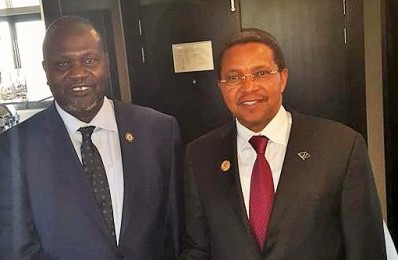South Sudanese rebel leader meets Tanzanian president over SPLM reunification process
June 15, 2015 (ADDIS ABABA) – South Sudan’s former vice president, Riek Machar, turned leader of the armed opposition faction of the ruling Sudan Peoples’ Liberation Movement (SPLM-IO), has met the president of the United Republic of Tanzania, Jakaya Kikwete, over the ongoing reunification process of three factions of the ruling party in the young country.

Rebel leader’s spokesman said the meeting centered on how best the Arusha intraparty dialogue on reunification could be complementing the Addis Ababa comprehensive peace process to end the civil war in South Sudan.
“The two leaders discussed how best to approach the Arusha SPLM intraparty dialogue as a complementary to the IGAD comprehensive peace process,” Machar’s spokesman, James Gatdet Dak, told Sudan Tribune when contacted on Monday.
He said the SPLM-IO leadership was committed to the intraparty dialogue which was addressing the root causes of the current crisis in the country in the context of the ruling party.
“You know the current national crisis started as a political crisis within the SPLM party before it developed national. If the rival party leaders can address those causes and accept SPLM transformation, reforms and leadership succession, I think they can also accept similar reforms on governance at the IGAD process,” he said.
Dak stressed that the Arusha reunification process would address democracy within the disintegrated ruling party including structural, organizational and leadership issues which caused the crisis.
He however said the process was not a substitute to the IGAD peace process and should not be misinterpreted to mean “mere reinstatement” of SPLM leaders previously dismissed “unconstitutionally” by president Salva Kiir following the crisis.
The rebel leader’s spokesman commended the Arusha roadmap agreement signed in January this year, describing it as a positive guiding document in resolving outstanding issues within the party.
“Our leadership believes that addressing the root causes of the conflict through the intraparty dialogue would positively reflect on the IGAD peace process,” he said.
But, he added, an intraparty agreement would not be an end in itself, ruling out what he said were misinterpretations by people who thought the rebel leadership would return to Juba if an agreement was struck by the SPLM factions.
Full implementation of a reunification agreement, he further stressed, was dependent on a final peace agreement in Addis Ababa that will resolve on all outstanding issues such as on governance and security arrangements and reforms outside the party’s jurisdiction.
President Kikwete’s ruling party of the Chama Cha Mapinduzi (CCM) has since last year been mediating between the SPLM in government (SPLM-IG) led by president Salva Kiir, SPLM-IO led by former vice president, Riek Machar and former detainees (FDs) led by former party’s secretary general, Pagan Amum in trying to reunify their ranks and file.
Observers say the process is expected to be complementing to the IGAD peace process to end the 18-month long civil war in the country.
(ST)
